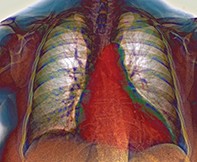Peer Reviewed
Feature Article Cardiovascular medicine
Chronic heart failure. Part 1: pathophysiology and patient assessment
Abstract
Significant advances in our understanding of the pathophysiology and treatment of chronic heart failure (CHF) have led to improved survival and quality of life for CHF sufferers; however, this condition remains a major cause of death and disability in our community.
Key Points
- Clinically, chronic heart failure (CHF) is a syndrome of dyspnoea, fatigue or exercise intolerance due to systolic or diastolic cardiac dysfunction.
- It is associated with a complex pattern of neurohormonal activation that results in fluid retention and vasoconstriction.
- While dyspnoea and fatigue are the cardinal symptoms of CHF, orthopnoea, paroxysmal nocturnal dyspnoea and ankle swelling strengthen the clinical suspicion of heart failure.
- Many patients with CHF have few clinical signs; a displaced apex beat is probably the single most reliable physical abnormality indicating cardiomegaly.
- All patients with suspected heart failure should undergo standard investigations comprising blood tests, ECG and chest x-ray; those with a clinical diagnosis of heart failure should have an echocardiogram.

